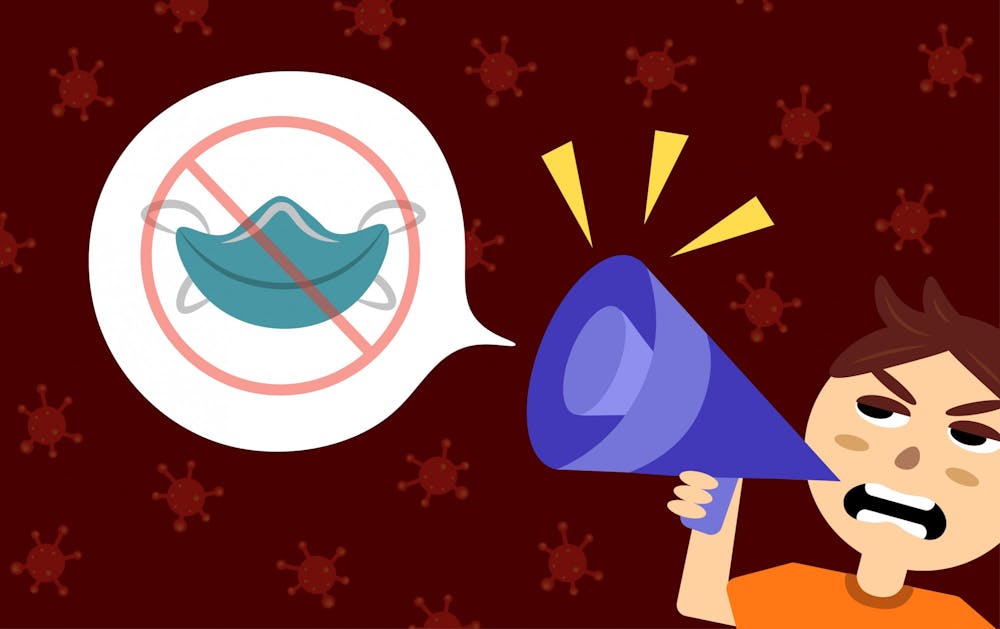We often hear that we should “question everything,” but conspiracy theories can stretch our skepticism too far. In making sense of this year's madness, some are prone to illogical conspiracy thinking.
COVID-19 and the pandemic are the subjects of many unfounded, widely circulated theories, and believing in these ideas can be dangerous. During global crises, decisions based on misinformation and invalid reasoning have real-world implications.
For instance, some conspiracy theorists undermine expert suggestions to help mitigate the spread of COVID-19, which poses risks to public health.
While experts state that mask-wearing helps prevent the virus from spreading, with some experts even suggesting masks provide moderate protection for wearers, several anti-maskers believe masks are unnecessary.
They often point to the Centers for Disease Control and Prevention's supposed flip-flopping: arguing that because the organization reoriented its stance on mask-wearing, their expert advice is now deemed illegitimate.
Inconsistent messaging, however, does not delegitimize expert claims. As more evidence surfaced about how COVID-19 spreads from people who don't show symptoms, the CDC decided to suggest mask-wearing in public. Experts continue to understand more about the virus with time.
In an email response, Dr. Keith Brown, director of the Melikian Center and professor at the School of Politics and Global Studies, said mistakes are normal in the pursuit of understanding new scientific information.
“Conspiracy thinking thrives by seizing on the flaws, errors, or paradigm shifts that are baked into the processes of scientific knowledge-production to throw doubt in the entire scientific enterprise,” he said.
Previous messages about masks do not mean that current claims from experts are invalid.
"Peer review, repeating experiments and debating conclusions are good for public health," Brown said. "Using anecdotal evidence to question the whole idea of expertise is not."
As reopenings happen in several states and case numbers surge, it is risky for theorists to undermine expert advice that intends to keep us as safe as possible. To protect public health, we should follow mask-wearing guidelines from organizations like the CDC and take any steps possible to decrease the spread.
COVID-19 conspiracy theories present another danger: polarization.
“The danger of conspiracy thinking is that it polarizes society and erodes public trust,” Brown said.
Because theories are often tied to political positions, this creates animosity between conspiracy believers and others. With the rise in tensions between China and the U.S., baseless theories are circulating about the origins of the virus.
For example, some theorize that 5G technology from Huawei, a Chinese technology company, weakens the immune system or helps spread the virus.
Others believe the pandemic is a “plandemic,” meaning the virus was lab-made as a bioweapon. This conspiracy theory gained some traction as officials in both China and the U.S. spread the idea.
According to a survey of U.S. adults who heard about the theory that COVID-19 was planned, around one-quarter think it is “definitely true” or “probably true."
Both theories about 5G and the virus being manmade are false. COVID-19 was not created in a lab and 5G doesn’t weaken the immune system or spread the virus.
Belief in these theories only augments antagonism. In the United Kingdom, anti-5G sentiment already played out in a devastating way, as arsonists set 77 cell phone towers on fire.
As tension grows between China and the U.S., believing in unfounded theories generates misplaced distrust. Some say the two countries are already experiencing an unarmed conflict-style Cold War, so this animosity is consequential for foreign relations.
It is unnerving and hazardous when citizens and politicians escalate hostility based on untrue theories.
In uncertain times, misinformation is a legitimate cause for concern. While we can be prone to conspiracy thinking, we must recognize and reject false information.
Don't assume conspiracy theories online are true: research, fact check and think critically. In an already tragic time for our world, it’s important we don't take actions that will create more harm to the health and safety of our communities and country at large.
Reach the columnist at lhrabik@asu.edu or follow @lynettehrabik on Twitter.
Editor’s note: The opinions presented in this column are the author’s and do not imply any endorsement from The State Press or its editors.
Want to join the conversation? Send an email to opiniondesk.statepress@gmail.com. Keep letters under 500 words and be sure to include your university affiliation. Anonymity will not be granted.
Like The State Press on Facebook and follow @statepress on Twitter.




